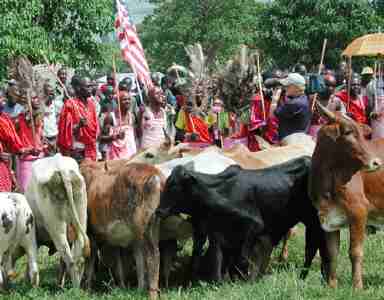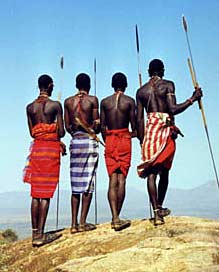Dairy and the Maasai

The Maasai (
above, donating cattle to the U.S. after 9/11) are one of Africa's more enduring pastoral cultures. Several hundred thousand tribal members and their cattle herds roam the Serengeti region of North Central Tanzania and the Masai-Mara in southern Kenya, resisting government pleas to adopt a more sedentary lifestyle.
Cattle represent wealth to these tall, proud people, so their importance goes far beyond that of just a ready food source. In fact, spiritually, they believe all the cattle in the world belong to their people.
This might explain how they justify their history of bloody cattle raids in earlier times. Violent though they may have been, they treat their animals extremely well and, except for occasional ceremonial functions, rarely slaughter them for meat.
Raw milk is the main staple of the Maasai diet, consumed both fresh and curdled. They store it in long gourds, and sometimes mix it with blood taken from the cow's jugular vein. Meat is eaten less frequently, but when there's a kill, they may consume pounds at a time.
Interestingly, even though they eat almost double the recommended portion of animal fats, their cholesterol levels are slightly lower than normal. They also show very little evidence of cardiovascular disease.
Couple abundant regular exercise with the consumption of over 25 plant foods rich in anti-oxidants (some stronger than vitamins C and E), and you'd expect to hear that the Maasai have a long life expectancy.

Sadly, that's not the case. Continual development encroaching on their semi-arid grazing lands, poor supplies of clean water, lack of sanitation, non-existent medical care and high levels of waterborne disease all take their toll. Many of their children die before reaching the age of five.
In today's modern world, and even with the healing power of raw milk on their side, the average Maasai male can expect to live for only 43 years, compared to 77 years for males in the U.S. (At right, Maasai men near Lekerruki Lodge, Kenya. Courtesy, Tusk Trust, www.tusk.org)